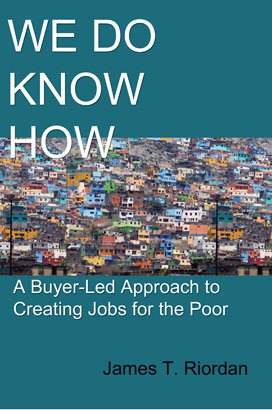
About the Author
James Riordan is a development economist with more than 35 years of experience in the design and implementation of business development, anti-poverty, rural development, and policy reform programs around the world. Jim has lived in Colombia, Peru, Egypt, and Albania and has worked in 59 countries. He has been a director at Chemonics International Inc. and directed USAID/Peru’s Poverty Reduction and Alleviation (PRA) program. For its innovative approach to attacking poverty, the program received Peru’s prestigious Creatividad Empresarial award.
WE DO KNOW HOW: A Buyer-Led Approach to Creating Jobs for the Poor
James T. RiordanVellum, 2011
510 Pages, 92 exhibits, 7 photos, 18 tables
ISBN 978-0-9832451-1-7 Paperback
For BULK ORDERS, order directly from New Academia Publishing.
Queries: orders@newacademia.com
About the Author
James Riordan is a development economist with more than 35 years of experience in the design and implementation of business development, anti-poverty, rural development, and policy reform programs around the world. Jim has lived in Colombia, Peru, Egypt, and Albania and has worked in 59 countries. He has been a director at Chemonics International Inc. and directed USAID/Peru’s Poverty Reduction and Alleviation (PRA) program. For its innovative approach to attacking poverty, the program received Peru’s prestigious Creatividad Empresarial award.
About the book
This book by a practitioner (not an academic, a government official, or a pundit) has been written for practitioners and offers fresh thinking on how to do international development work. It combines that thinking with practical guidance, in plain English, on what to do—and perhaps just as importantly—what not to do on the ground. We Do Know How takes buzzwords commonly used in development circles—“demand-driven,” “results-oriented,” “accountability,” and others—and makes them real, spelling out a proven approach for expanding business sales and generating jobs for poor people.
Although government has a role to play in development, in the end the actions of businesses drive economic growth and expand people’s incomes. We Do Know How shows how to build on the incentives that drive businesses and, in the process, create jobs for the poor. Specifically, it urges development practitioners to support only those business opportunities for which there is market demand, abiding by the maxim, “produce what you can sell,” not “sell what you produce.” More than that, it cautions practitioners not to become solutions looking for problems but to search creatively for ways to solve the specific problems that stand most in the way of clients meeting buyers’ requirements.
We Do Know How challenges much conventional wisdom on how to do development work. At the same time, and in contrast to other books on development, it shows how, by maintaining focus and discipline, development practitioners can deliver demonstrable increases in jobs for those who need them.





 Coming Soon
Coming Soon Awards
Awards